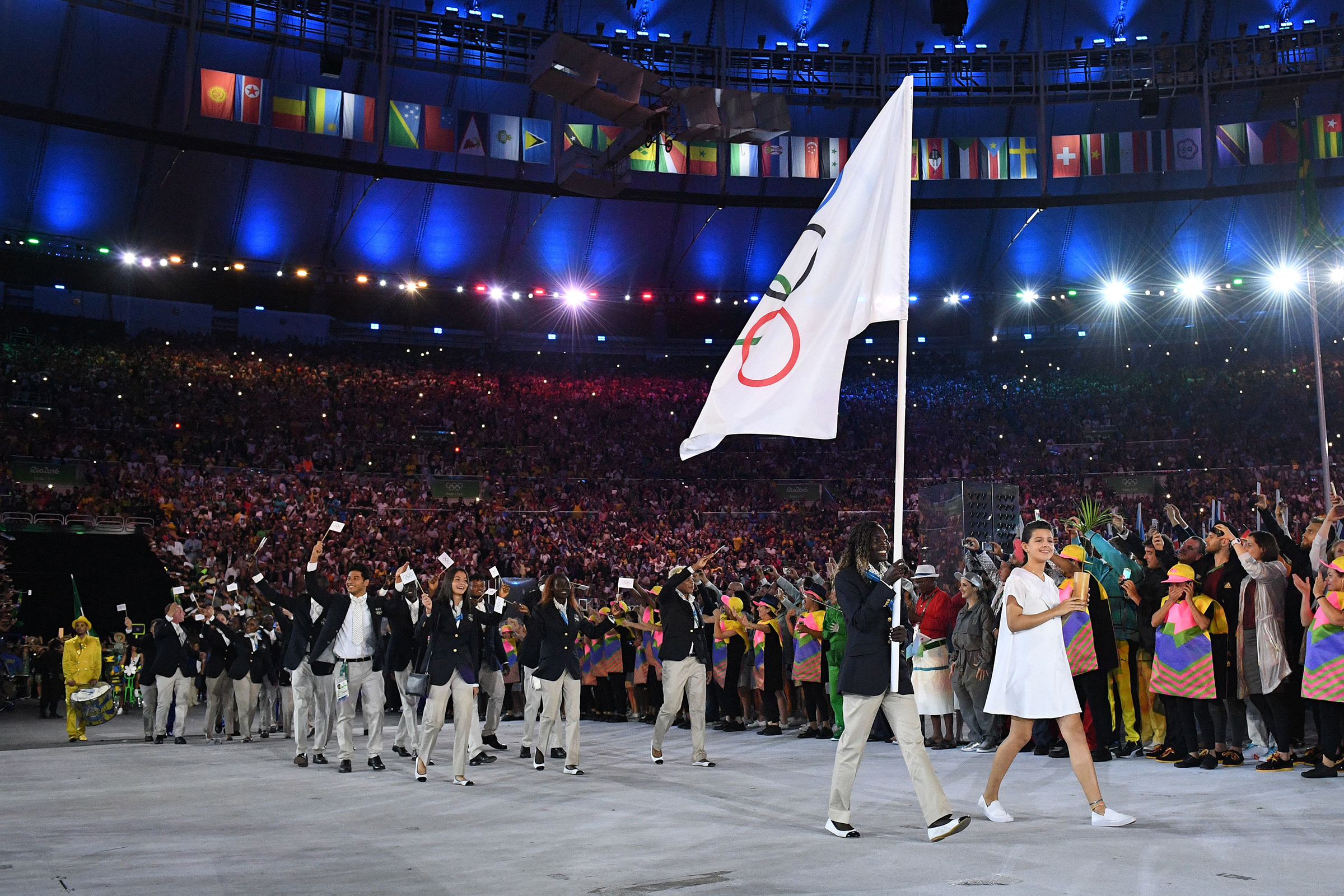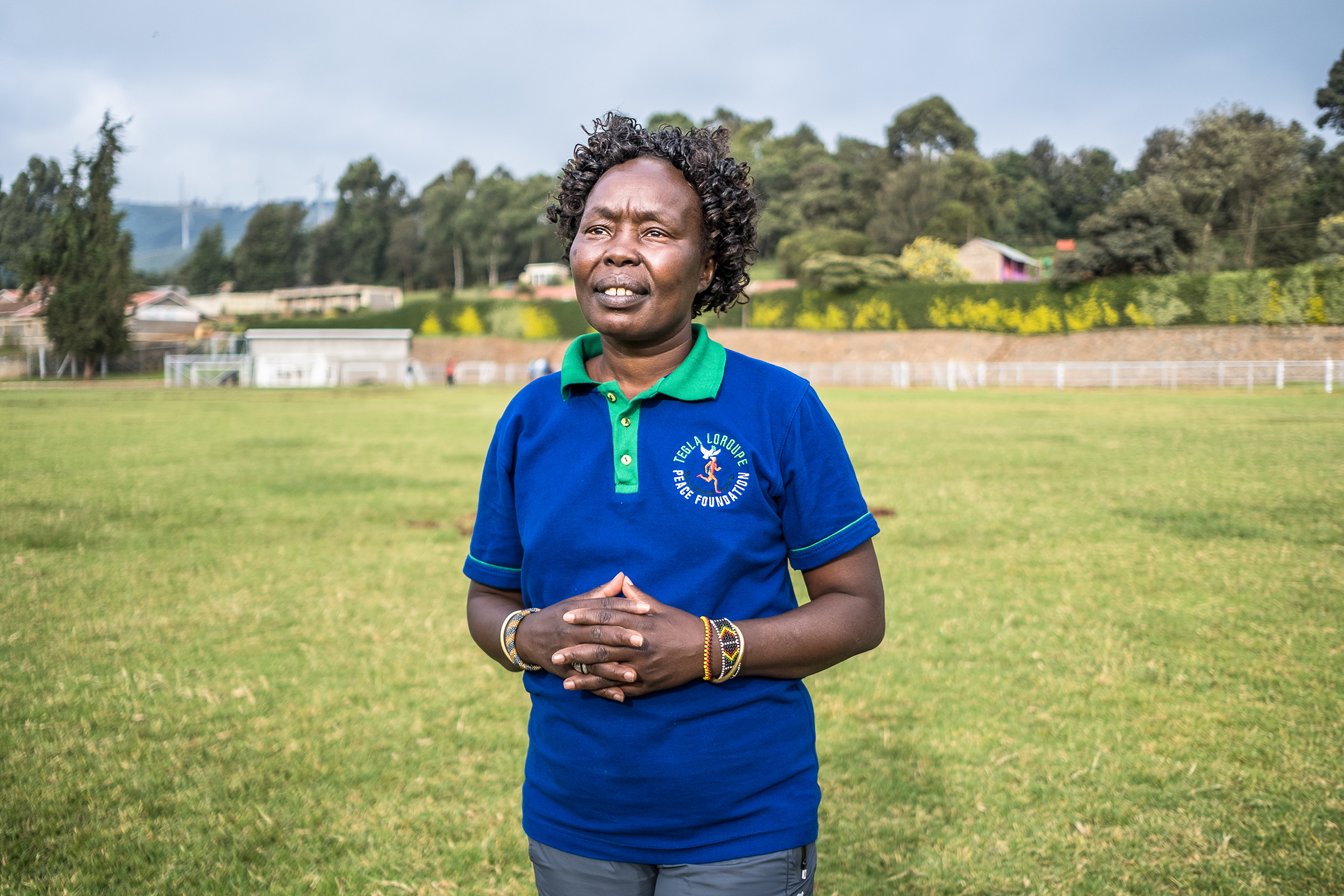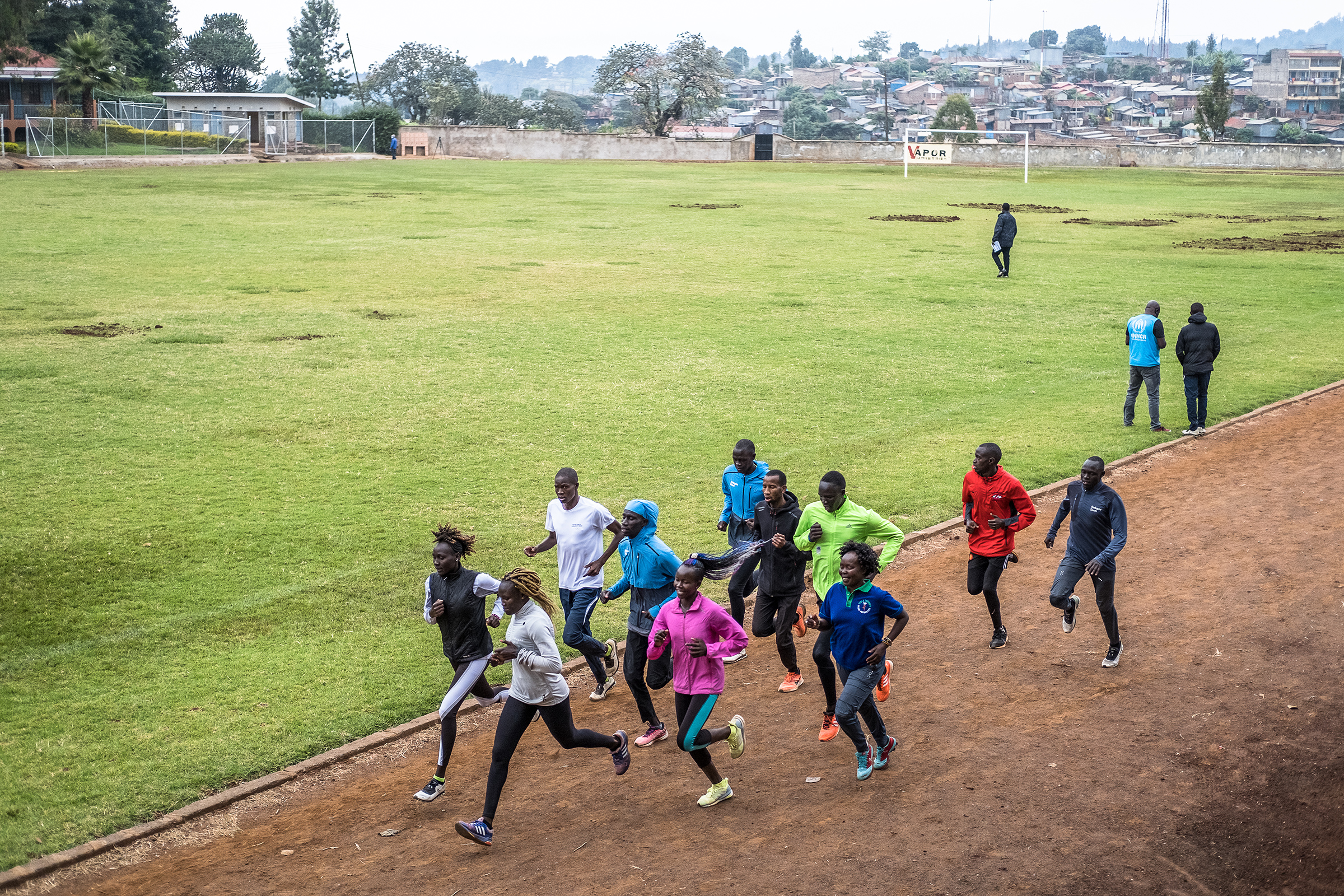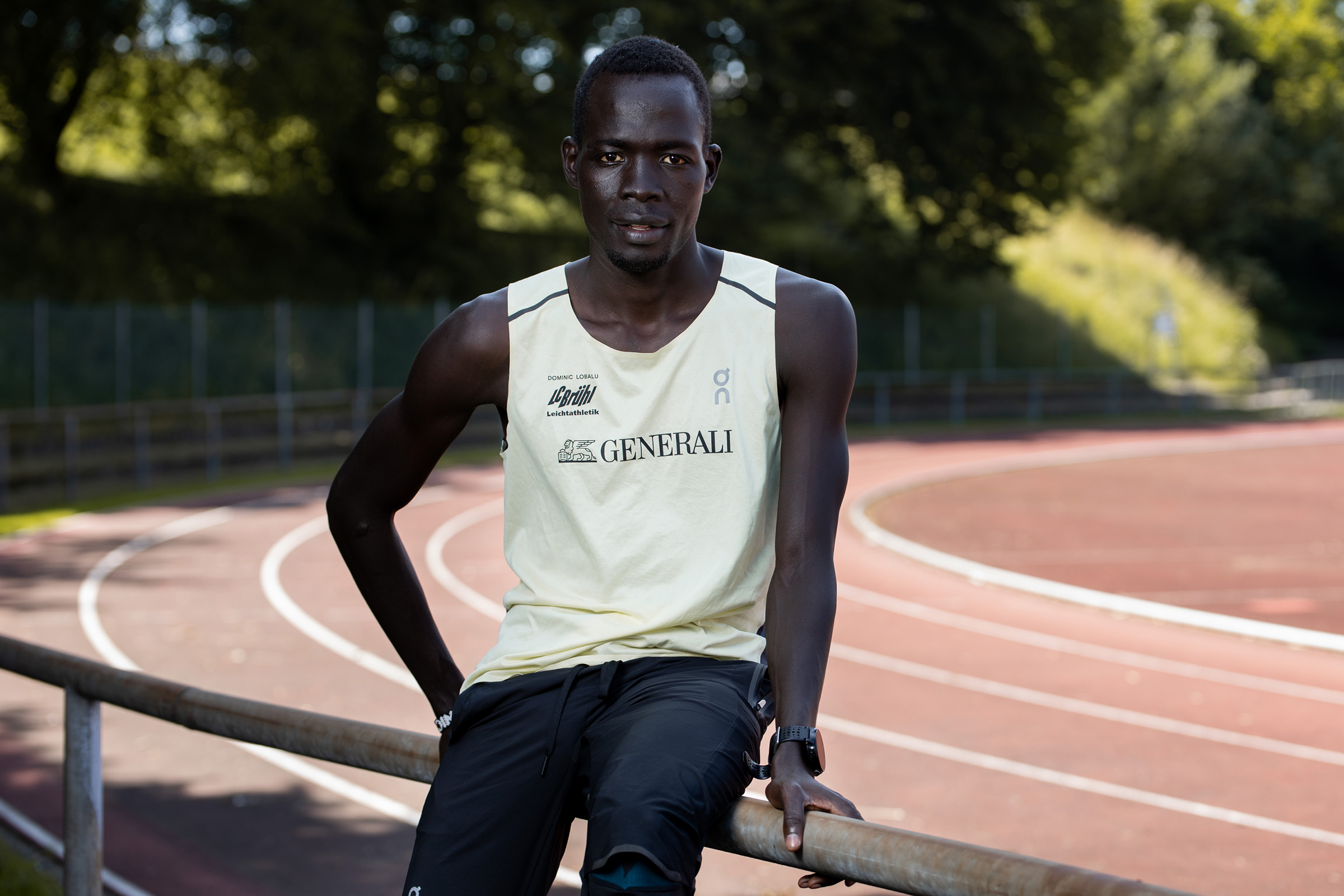One day in Spring 2019, more than 2,880 runners competed in a 10-km race in Geneva. It was a regular event on the athletic calendar, but this time with a striking result. The winner was an orphaned refugee from South Sudan, exiled in Kenya, who had laced up his first pair of running shoes only a few years earlier. Atop the podium, clutching a bouquet of flowers and a trophy, Dominic Lokinyomo Lobalu grinned with delight. “I am very happy to have won today,” he said. “I am going back to even more intense training when I return to Kenya.”
But Lobalu did not go back. Later that day, he would ask about the prize money he assumed he had won. His questions were directed to the managers who had traveled with him to Switzerland. In fact, the race came with no prize money, but that did not explain the evasiveness of the replies Lobalu recalls getting from his managers. They would all discuss the matter once they returned to Kenya, he was told.
“I thought, These people, there was something they were hiding,” he says.
Nothing is straightforward in the life of a refugee, but for at least a moment five years ago, it seemed as though sports might be. At the opening ceremony of the 2016 Olympic Games in Rio de Janeiro, the first IOC Refugee Olympic Team marched behind the flag not of a nation but of the Olympics themselves. A joint effort of the United Nations High Commissioner for Refugees (UNHCR) and the International Olympic Committee (IOC), the team won even before its 10 members competed, lifting the Games out of the realms of self-dealing, cost overruns and doping scandals, and into the realm of ideals, a place the Olympic officials like to be.
There will be another IOC Refugee Olympic Team at the opening ceremony in Tokyo’s Olympic Stadium on July 23. With 29 members, it has nearly three times as the number of athletes who competed in Rio, representing a population of 20.7 million, the current estimate of people who have fled their home nation.
The most glittering sporting event on the planet will be elevated once again by epic personal histories involving bloodshed, poverty and a level of endurance other Olympians could scarcely imagine.

But things are no longer so simple. As Lobalu’s experience shows, even refugee Olympians grapple with the same questions—about money, power, control and personal agency—that dominate elite sports as much as athletic ability does.
The training camp to which Lobalu did not return is outside the Kenyan capital, Nairobi. Known as the Tegla Loroupe Peace Foundation Training Center, the camp was founded by Loroupe, a legendary Kenyan runner—and a two-time winner of the New York City Marathon. Her organization was the inspiration for, and the core of, the first Refugee Olympic Team, half of whose members lived and trained at the Kenya site.
The camp will send four runners to Tokyo, all of them, like Lobalu, exiled from war-ravaged South Sudan. But absent from the Tokyo Olympics refugee team are six of its strongest runners, who spent years training for the Games at the camp in Kenya—and who then absconded from the program, effectively fleeing the team with little warning and against all the rules, from 2017 to 2019. In interviews with TIME, two of those six men say their decisions were driven in part by rising tensions over their training and dissatisfaction with a system that, to them, appeared to deny them opportunities to create lives outside the program.
Lobalu, who had dreamed of being the first Olympic refugee medalist, became on that spring day in 2019 the most recent of the six defectors. Within hours of winning the race in Geneva, he made a decision that would change his life and doom his prospects of running in Tokyo this month.
The conversations after the Geneva race had been the final straw, Lobalu says. Implicit in the -manner of his managers was the belief that as refugees the athletes should accept whatever they had, whether there was prize money or not—an attitude he steadily began to reject.
“We cannot talk about money. We were supposed to go, and come back to the camp,” Lobalu, now 22, tells TIME. “They took us to Geneva, so we cannot complain… We are not supposed to talk, because we are just a refugee.”
Before dawn the next morning, he slipped out of the team’s Geneva hotel with a fellow South Sudanese refugee, Gatkuoth Puok Thiep. They left no note. The two friends wandered for hours, with no money or contacts, and only one plan: they would not return to Kenya with their teammates; somehow they would find a way to stay in Switzerland.
The break was clean, but the feelings remain complex. The decision to quit the program left each athlete TIME spoke to highly conflicted. The two former athletes from the Loroupe program said they felt they were being denied opportunities and prize money, and they spoke of an atmosphere in the training camp of overbearing control. At the same time, even athletes who left the team spoke of how the training in Kenya had transformed their lives, giving them passion and purpose they otherwise might never have found.

They singled out for special gratitude Loroupe, who remains in charge of the camp and who fielded TIME’s questions about the controversies. Loroupe created her organization in 2003 to organize “Peace Runs” comprising warring tribes, and she is now the IOC’s “chief of mission” for the refugee team at the Tokyo Olympics. “She is not just the coach; she is the mother of everyone,” says Gai John Nyang, who fled the team in 2017 amid an angry dispute and who now lives in Mainz, Germany. “Everyone respects her, even me, right up to today.”
This month, the emotions of the athletes are particularly raw as they watch their four close friends from the training camp head to the Tokyo Olympics. Those who left the camp also forfeited their chance to compete. The IOC and UNHCR ruled that Lobalu, Nyang and the other four runners who defected could not even try out for the Olympics team.
The athletes call that arbitrary punishment for having dared to walk away from the team. But the U.N. and the IOC say the men are no longer officially refugees, a protected status intended for those caught between countries, and forfeited upon settlement in one. Loroupe adds that allowing them to compete in Tokyo would encourage those still in her training camp to try to leave too. Indeed, Loroupe met with Lobalu in Switzerland seven months after he quit the team and tried to coax him to return to Kenya so he could run in the Tokyo Olympics, according to Lobalu. “She said, ‘You will get all the chance you are looking for,’” he says. He turned her down, and now will watch his friends in Tokyo from 7,000 miles away.
The very fact that 29 refugees representing 13 nationalities are competing in Tokyo upends a fundamental feature of the Olympics, which for more than a century has been organized around national patriotism. “Most of the refugees lacked the right to compete,” Olivier Niamkey, the IOC’s deputy chief of mission for the refugee program, tells TIME, describing the organization’s negotiations with various athletics federations, which finally cracked open the door to refugees in 2015 after long discussions. “It is not just about money,” he says. “They have no flag to compete under.”
Indeed, to assemble the refugee team, the IOC asked nations to do the sorting. The original group of 43 candidates for the 2016 Games was identified. In Kenya, Loroupe knew where to look for runners. She traveled to the country’s northern border and the Kakuma refugee camp, a sprawling, sun-baked settlement operated by the UNHCR and home to at least 170,000 refugees from nearby countries. To identify potential talent, Loroupe staged a 10-km race.
From those who showed up—some barefoot, some with barely any footwear, none having run an organized race—she picked the fastest and flew them 450 miles south to her training camp in the lush Ngong hills just outside Nairobi. “I didn’t even know what is the Olympics,” says Rose Nathike Lokonyen, 28, who is on the IOC Refugee Olympic Team again in Tokyo for the second time, after the Rio Games. In Ngong, 93 miles south of the equator and 1.2 miles above sea level, they began rigorous, high-altitude training for the Rio Olympics. Raised in the Kakuma refugee camp, Lokonyen ran barefoot in Loroupe’s 10-km race in 2015 and finished second. “We didn’t know about time,” she tells me, recalling that race. “We just ran.”
The point of the Refugee Olympic Team, in fact, is not to clock the fastest time. That would be a daunting task, given that elite runners train for years on state-of-the-art tracks before reaching the Olympics. The point, rather, is to be there. “We want to send a message of hope for all refugees in our world,” IOC president Thomas Bach said before the Rio Games. For the refugees who, like the South Sudanese runners, have witnessed intense brutality, the program has also helped heal painful traumas. Running, says Nyang, “is like medicine to me. When I run, I calm down.”
From being touted as a one-off event for the 2016 Games amid a swelling of refugees emerging from the Middle East and nations including Eritrea and Somalia, the program now appears increasingly permanent. For this year’s pandemic-postponed Olympic Games, the IOC expanded the program to include other parts of the world, and more sports. Niamkey says the IOC’s Olympic Solidarity fund set aside $3 million between 2016 and 2021 for scholarships for 56 refugee athletes worldwide, out of a total budget of about $100 million to fund thousands of athletes. Disbursements, he says, are in the form of monthly $1,500 payments.

There is an exception to that: the athletes at the Tegla Loroupe camp in Kenya. Niamkey estimated the payments to the refugees there were “between $100 and $200” a month. But both Nyang and Lobalu independently said they received a monthly stipend of 5,000 Kenyan shillings (about $46 at current exchange rates). After TIME asked the IOC to check, the organization confirmed that the payments were indeed 5,000 Kenyan shillings.
An IOC spokesperson said the money was meant as “pocket money” for the athletes in Loroupe’s camp, whose living expenses were covered; the athletes live in four-bed dormitory rooms and cook communally. When TIME asked Loroupe about the payments, her reply was: “Our athletes are not there just to be paid. They are there for a reason.”
Nyang says that before leaving the training program in 2017, he regularly borrowed money from locals to cover expenses. “What can you do with $50?” he says. Complaining was fruitless, according to Lobalu, the athlete who absconded in Geneva. “They would say, ‘If you don’t like the place, pack your bag and go back to Kakuma,’”the refugee camp, he says. “You get food and bed and a room for free.”
Between the quadrennial Olympics, the athletes participate in competitive races around the world to give them the experience of competing at a high level. But Lobalu and Nyang each claimed in separate interviews that they did not receive prize money for their achievements at such events, even those with prize money.
An executive at On, the Swiss athletic-footwear company that helps finance the Tegla Loroupe Peace Foundation and that supplies running shoes to the team, confirms they were made aware of money not reaching athletes—including bonuses for participation in events like the 2017 World Athletics Championships in London, where two of the runners fled the team, absconding from the Kenya training program and staying in the U.K. “There were bonuses, and those were paid out to the foundation, and it was the foundation’s responsibility to hand them to the athletes,” says Feliciano Robayna, On’s head of sports marketing, who handles the partnership with the refugee team and who has twice visited the Kenya camp. “We went out of our way [to ensure that was happening], after hearing that some bonuses did not reach the athletes’ hands,” he says.
In response to the athletes’ allegations, Loroupe told TIME that athletes received prize money for competing in races. “It is their money,” she says. Told of her response, Lobalu laughed. “O.K.,” he says skeptically. “Maybe after I left.”
For Nyang, it was less the absent prize money that drove him away and more the sense of missed opportunity. He described mounting tensions in the camp, with managers who appeared to favor some athletes over others, and rising fears of retribution if anyone complained. What Nyang most feared, he says, was being sent back to the Kakuma refugee camp, “which is horrible.” He says he also increasingly feared for his personal safety in Kenya, as a South Sudanese refugee. More than anything else, he says, he felt like he was stuck. “Of course no one wants to live somewhere where nothing changes,” Nyang said, referring to the training camp. He says he recalled thinking, “There is no other future, only to say, ‘O.K., I have to go my own way.’”
He and another South Sudanese refugee, Wiyual Puok Deng, did so in dramatic fashion—refusing to board a flight back to Kenya from Frankfurt after competing at the Asian Games in Turkmenistan in 2017. Both Nyang and Lobalu said they felt as if refugee athletes were discouraged from moving on or offered little help to do so. One other person agreed. “They [the refugee training camp] want to keep them for themselves,” said one source who had tracked the athletes for five years, spent time at Loroupe’s training camp and kept in close touch with them. “It [the training program in Kenya] was more for the UNHCR than for the athletes.”
Asked about these accusations, Stephen Pattison, the UNHCR’s deputy chief of mission, said the defections from the Kenya training camp prompted the commission and the IOC to try to secure scholarships for runners picked for the Tokyo Olympics team—all of whom competed in the Rio Olympics five years ago. Speaking to TIME by telephone in a conversation that the IOC insisted it monitor, Pattison said the thinking was that athletes badly needed the prospect of real opportunities after the Olympics—something the IOC and UNHCR had failed to offer after Rio and, according to the two defector athletes Lobalu and Nyang, a reason the Kenya program lost six talented runners. “We understood that there was a concern about what happens next,” Pattison said.
Loroupe told TIME in an interview from Kenya (also with an IOC representative in attendance) that she bore no responsibility for the six men who have fled her camp. “I would not be happy to take such a blame there,” she said, when asked whether she might have discouraged athletes from leaving. For those who want to leave, she said, “they have to go the right way.”

For Dominic Lokinyomo Lobalu—the star runner—there was no “right way” to leave, as Loroupe says. Within hours of winning the race in Geneva, he had broken ranks from the refugee team and fled his hotel. Like Nyang’s, Lobalu’s family had scattered while fleeing their war-torn village in South Sudan, a country that came into being in 2011 after a decades-long civil war with Sudan, and where fighting has remained common in independence. He spent some of his childhood in an orphanage, playing soccer as a way to dull the intense pain of loss, eventually taking up running at a school near Nairobi, where he was discovered by Loroupe.
Three months after Lobalu went AWOL from Loroupe’s team, a Swiss refugee center contacted Markus Hagmann, an athletics coach in Saint Gallen, Switzerland, saying there were two South Sudanese men who wanted to run. Hagmann invited them to his club and instantly spotted major star potential in Lobalu. He brought him to the first race he could find in Switzerland.
Lobalu won the race—and has continued winning in Switzerland. In addition to On, he also now has endorsement funding from the Italian insurance giant Generali. In late June, he ran a 5,000-m Swiss race in 14 min. 1 sec., one-thousandth of a second behind the winner—who is competing for Switzerland at the Tokyo Olympics. Unable to compete at Tokyo (he too has no official refugee status), Lobalu will instead spend July and August training at an athletic center high in the Swiss Alps.
Meanwhile, On’s marketing chief, Robayna, says the company has hired a lawyer to secure residence status in Switzerland for Lobalu, whose renown has grown among the country’s runners. Hagmann estimates that it could take up to 10 years for Lobalu to become a citizen, making it uncertain whether Lobalu will be able to compete as a Swiss national in the 2024 Olympics in Paris.
As for the question of money, after winning his first Swiss race back in 2019, Lobalu climbed into Hagmann’s car. There, Hagmann showed Lobalu the 200 Swiss francs (about $218) he had won, then deadpanned, “Oh, this is mine now,” Hagmann recalls. “He went white, and I said, It’s a joke. It was the first time he realized, ‘No one is going to take my money away from me.’”
—With reporting by Nik Popli and Simmone Shah/Washington
Read more about the Tokyo Olympics:
More Must-Reads from TIME
- Cybersecurity Experts Are Sounding the Alarm on DOGE
- Meet the 2025 Women of the Year
- The Harsh Truth About Disability Inclusion
- Why Do More Young Adults Have Cancer?
- Colman Domingo Leads With Radical Love
- How to Get Better at Doing Things Alone
- Michelle Zauner Stares Down the Darkness
Contact us at letters@time.com